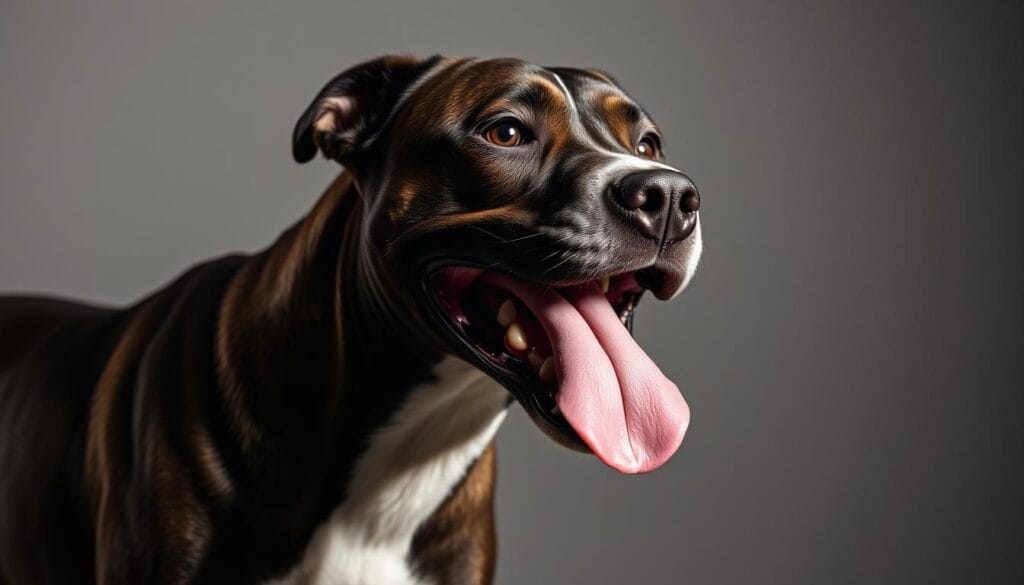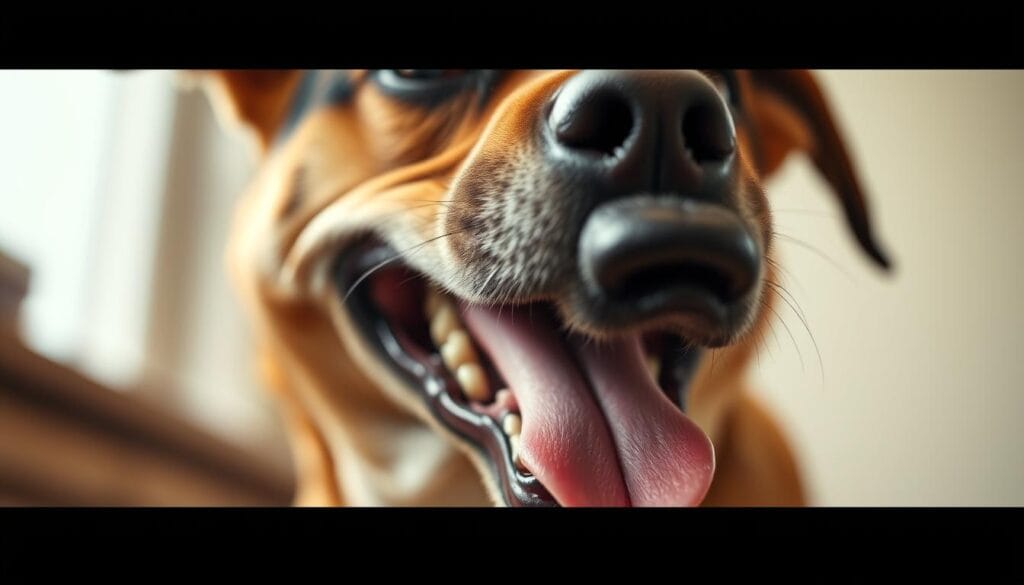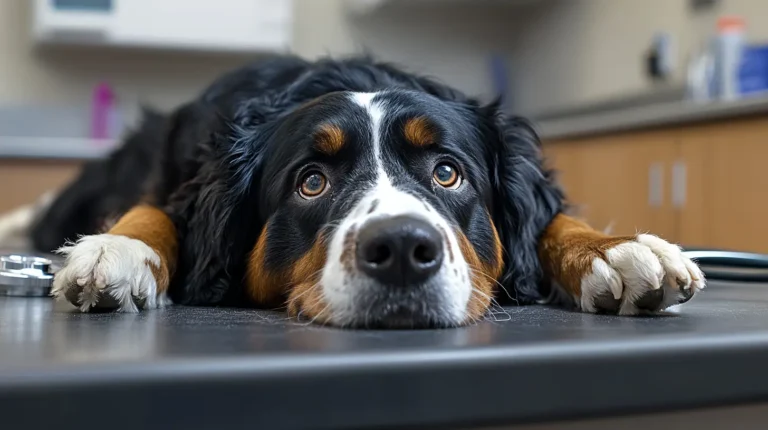Dog breathing heavy: Why it happens and when to worry
Dogs typically breathe between 10 to 30 times a minute, but this can vary depending on their size and breed. Some dogs, especially those with short snouts, may experience dog breathing heavy more frequently. If you notice your dog breathing heavy, it might cause concern. However, when does dog breathing heavy become a sign of something serious?
Table of Contents
Understanding the difference between normal panting and dog breathing heavy is crucial for maintaining your pet’s health.
Heavy breathing in dogs can sometimes signal a serious health issue, so it’s important to recognize the signs and respond promptly. If your dog is breathing heavy, there could be several reasons behind it.
These include heatstroke, chronic illnesses, or injuries. While dog breathing heavy can sometimes be a normal reaction to exercise or excitement, it may also indicate an underlying problem that requires attention.
Key Takeaways
- Dogs typically take between 10 to 30 breaths per minute, depending on their size.
- Certain breeds are predisposed to heavier breathing due to their short snouts.
- Heavy breathing can be a sign of a medical emergency, such as heatstroke or chronic illnesses.
- Why is my dog breathing fast? It could be due to exercise, excitement, or an underlying condition.
- Dog breathing heavy requires attention, and it’s essential to recognize the signs and take action.
- Understanding the difference between normal panting and heavy breathing is key for your dog’s health.
Understanding Normal Dog Breathing Patterns
As a dog owner, knowing what’s normal in your pet’s breathing is key. You might have asked why is my dog breathing heavy or seen signs of dog difficulty breathing. But first, let’s look at what’s considered normal breathing rates.
A healthy dog’s breathing rate changes based on their size, age, and how active they are. A normal resting or sleeping breathing rate for dogs is between 15-30 breaths per minute. If your dog’s breathing rate is over 30 breaths per minute while resting or sleeping, it’s not normal.
What constitutes normal breathing rates
To understand your dog’s breathing, it’s important to watch their rate often. Count how many breaths your dog takes per minute. Start by checking their breathing rate once a day for a week to set a baseline.
The difference between breathing and panting
It’s also key to know the difference between breathing and panting. Panting is normal for dogs, like after they exercise or when it’s hot. But if your dog is panting too much or seems to be having trouble breathing, it could mean there’s a problem.

When panting is perfectly normal
Panting helps dogs cool down and breathe. If your dog pants after playing or when it’s hot, it’s probably okay. But if your dog pants a lot or seems stressed, like why is my dog breathing heavy, you should see a vet to check for health issues.
Why Is My Dog Breathing Heavy? Common Causes
As a dog owner, it’s normal to worry if your dog is breathing heavily. There are many reasons for this, from the environment to serious health issues. If your dog is breathing fast while sleeping, it’s important to find out why.
Heavy breathing can be due to heatstroke, chronic illness, injury, or medication. Breeds like Boston terriers, boxers, and pugs are more likely to have breathing problems. Fast panting can mean serious health issues like asthma or lung diseases.
Signs of trouble include heavy, fast breathing and panting that starts suddenly. Other signs are open-mouthed breathing, not wanting to eat or drink, and drooling. If you see these, get your dog to the vet right away. They might do X-rays to check for lung problems.

There are many reasons for dogs to pant a lot, like exercise or lung diseases. Treatment depends on the cause, and sometimes dogs need to stay in the hospital. Working with your vet is key to finding out why your dog is breathing hard and how to help them.
It’s good to know that a healthy dog breathes 15 to 35 times a minute when resting. More than 40 breaths a minute is not normal. If your dog is breathing over 30 times a minute, it could be a sign of a problem. By understanding why dogs breathe heavily and getting vet help when needed, you can keep your dog happy and healthy.
Signs Your Dog’s Heavy Breathing Needs Medical Attention
If your dog is breathing heavily, watch them closely and get vet help if they seem distressed. Why is my dog breathing fast worries many owners. Finding out why is key.
Look out for emergency signs like pale or blue gums, heavy panting with a closed mouth, and coughing with heavy breathing. Seeing these means you should get vet help fast.
Other signs include not wanting to eat or drink, gum color changes, and signs of stress like tucked tails and ears back. If you see these, call your vet right away. Remember, dog breathing heavy can mean a serious health issue. Quick vet care is vital for your dog’s health.
Common reasons for breathing issues in dogs include lung infections, heart disease, and upper airway problems. If you’re worried about your dog’s breathing, get vet help to find and treat the cause.
Heat-Related Heavy Breathing in Dogs
As a dog owner, you might wonder why is my dog breathing heavy in summer. Heavy breathing in dogs is common during hot months. It’s important to know that dog difficulty breathing can mean heat stress or stroke, which are serious.
Some dogs, like brachycephalic breeds, are more at risk. So are obese and older dogs. It’s key to spot heat stress and stroke signs, like:
- Increased thirst and panting
- Weakness and episodes of collapsing
- Change in gum color (bright red or pale)
- Increased heart rate and respiratory rate
To prevent heavy breathing, keep dogs hydrated and cool. Make sure they have a cool, well-ventilated spot to rest. Never leave a dog in a car, as it can get very hot fast.
By taking these steps and knowing heat stress and stroke signs, you can keep your dog safe in summer. If your dog breathes heavily or shows heat illness signs, get vet help right away.
Exercise and Activity-Induced Rapid Breathing
If you own a dog, you’ve probably seen them panting after exercise. This is usually normal, but it’s important to watch their breathing. If they’re having trouble breathing, it could be a sign of a problem.
After hard exercise, dogs breathe fast to get more oxygen and cool down. This is okay, but you should watch for any signs of distress. If your dog breathes fast while sleeping, it might mean they have a health issue.
Some dogs, like Labradors and Cocker Spaniels, can get a condition called exercise-induced collapse (EIC). This makes them breathe fast, feel weak, and even collapse. If you think your dog has EIC or breathing problems, see a vet right away.
It’s key to know when your dog’s breathing is normal or not. By watching for signs and avoiding too much exercise, you can keep your dog healthy. Always talk to your vet if you’re worried about your dog’s breathing or health.
Medical Conditions Causing Dog Breathing Problems
As a dog owner, it’s key to know that dog breathing heavy might mean there’s a health issue. If you’re asking why is my dog breathing fast, look into the reasons. Many health problems can cause dogs to have trouble breathing, from heart issues to lung diseases.
Heart-Related Issues
Heart disease, like congestive heart failure, can make dogs breathe hard. This is because the heart can’t pump blood well. Fluid builds up in the lungs, making it hard for your dog to breathe.
Respiratory Diseases
Respiratory diseases, like pneumonia or chronic bronchitis, can also cause breathing issues. These conditions cause inflammation and congestion in the airways. This makes it hard for your dog to breathe.
Other Underlying Health Conditions
Other health issues, like lung infections, upper airway disease, or trauma, can also lead to dog breathing heavy. It’s important to work with your vet to find out why your dog is having breathing problems. Then, you can create a good treatment plan together.
Some common medical conditions that can cause dog breathing problems include:
- Lung infections (such as pneumonia)
- Heart disease/congestive heart failure
- Upper airway disease
- Trauma
Breed-Specific Breathing Concerns
As a dog owner, you might wonder why is my dog breathing heavy. Is it because of their breed? Some breeds are more likely to have breathing problems. This is because of their body shape or genes.
For example, dogs like Bulldogs, Pugs, and Boxers often have trouble breathing. This is because their noses are short and their soft palates are long.
When thinking about breed-specific breathing issues, consider these points:
- Brachycephalic airway syndrome (BAS) can make dogs pant a lot and get too hot.
- Upper airway disease can cause breathing problems in some breeds.
- Some breeds are more likely to have heart disease or other conditions that affect breathing.
It’s important to know about these issues and how to manage them. If you’re worried about your dog’s breathing, talk to a vet. They can figure out why your dog is heavy breathing and tell you how to help.
Understanding and managing breed-specific breathing concerns can help your dog stay happy and healthy. If you see signs like rapid breathing or wheezing, get vet help right away.
Nighttime Heavy Breathing and Sleep Patterns
Have you noticed your dog breathing heavily or rapidly while they sleep? This can be a worrying sign, often seen with restlessness or pacing. It’s key to know what’s normal in a dog’s sleep breathing and when to worry.
Dogs, like humans, can have different breathing patterns while sleeping. But, if your dog breathes heavily, it might mean there’s a problem. This could be sleep apnea, which causes pauses in breathing and can lead to shortness of breath.
Normal sleep breathing vs. concerning symptoms
Normal sleep breathing in dogs is steady and rhythmic. But, if your dog breathes quickly while sleeping, it’s a sign to watch. Look out for these signs of a possible issue:
- Excessive panting or heavy breathing
- Restlessness or pacing during sleep
- Pauses in breathing or sleep apnea
- Whining or whimpering during sleep
Sleep apnea in dogs
Sleep apnea in dogs is a serious condition that needs vet attention. If you think your dog has sleep apnea, get them checked by a vet. Watching your dog’s sleep and knowing the signs of sleep apnea can help keep them healthy and happy.
Prevention and Management Strategies
As a dog owner, it’s key to know how to prevent and manage dog breathing heavy. You can help your dog breathe better by making some changes. For example, keeping your home cool and well-ventilated can help.
Changing how you exercise your dog is also important. Try to avoid walks in the heat and opt for shorter, gentler ones. This can help prevent dog breathing heavy and lower the risk of heat exhaustion.
Making lifestyle changes can also help a lot. Keeping your dog at a healthy weight and getting regular vet check-ups are important. Also, watching your dog’s breathing can help spot problems early. By doing these things, you can help your dog stay happy and healthy.
Key Prevention Strategies:
- Keep your home cool and well-ventilated
- Avoid exercising your dog in hot weather
- Maintain a healthy weight for your dog
- Provide regular veterinary check-ups
- Monitor your dog’s breathing rate
When to Seek Emergency Veterinary Care
If you’re wondering why is my dog breathing heavy, it’s key to know when to act fast. Dog difficulty breathing can signal serious health issues. Look out for these signs to get your dog the help they need quickly.
Watch for a blue or purple color on your dog’s gums, a high fever, or serious injuries. Also, if your dog vomits a lot in one day, shows allergic signs, or has seizures over 2-3 minutes, get emergency care.
Other signs that may mean dog difficulty breathing or serious problems include:
- More than 50 breaths per minute when resting
- Shortness of breath or unusual sounds while breathing
- A bloated belly or swollen abdomen
- Pain signs like crying out or straining to pee
It’s always safer to be cautious with your dog’s health. If you’re not sure about any symptoms or changes, talk to a vet or emergency clinic. This can help avoid making things worse or causing more harm.
Treatment Options for Different Breathing Issues
Canine shortness of breath or rapid breathing while sleeping needs different treatments. It’s key to talk to a vet to find the right solution. They can help figure out what’s causing the problem.
Medical help might be needed to manage breathing issues. This could include medicines to reduce swelling or open airways. Oxygen therapy can also increase blood oxygen levels.
Home care is also important for your dog’s recovery. Make sure they have a quiet, comfy place to rest. Keep an eye on their breathing and health. Here are some home care tips:
- Provide a cool, well-ventilated space for your dog to rest
- Encourage your dog to stay hydrated with plenty of fresh water
- Watch your dog’s breathing and health closely, and get vet help if needed
Long-term plans might be needed to manage breathing issues. This could mean changing your dog’s lifestyle. For example, reduce exercise or avoid things that make breathing worse. With your vet’s help, you can make your dog’s life better.
Conclusion
Learning about heavy breathing in dogs is key for their health. By spotting abnormal dog breathing signs and understanding causes, you can help them. This way, your dog can breathe better and live a healthier life.
Regular vet visits and taking care of your dog’s health are important. They help prevent and manage breathing problems. With your care and your vet’s help, your dog will breathe easily for many years.
FAQ
What constitutes normal breathing rates in dogs?
A healthy dog’s breathing rate changes based on their size, age, and how active they are. If your dog breathes more than 40 times a minute, it might mean there’s a problem.
What is the difference between breathing and panting in dogs?
Panting helps dogs cool down. But, if they’re breathing heavily, it could be a sign of something serious.
When is panting perfectly normal for dogs?
Panting is okay when dogs are hot, excited, or have been active.
What are the common causes of heavy breathing in dogs?
Many things can cause heavy breathing in dogs. This includes environmental factors and serious health issues.
What are the emergency warning signs that indicate my dog needs medical attention for heavy breathing?
If your dog is breathing heavily, watch them closely. Look for signs of distress like open-mouth breathing, flared nostrils, or trouble breathing. If you see these, get them to a vet fast.
Why does my dog experience heavy breathing in the heat?
Heat can make dogs breathe heavily, more so in summer. High temperatures, humidity, and not having water or shade can all play a part.
How do I know if my dog’s breathing is normal after exercise?
After exercise, dogs might breathe fast. But, make sure their breathing goes back to normal in 5-10 minutes. This is important for their recovery.
What medical conditions can cause breathing problems in dogs?
Many health issues can lead to breathing problems in dogs. This includes heart problems and respiratory diseases.
Are some dog breeds more prone to breathing issues?
Yes, some breeds are more likely to have breathing problems. This is because of their body shape or genetics. For example, pugs, bulldogs, and Boston terriers often have trouble breathing.
Is heavy breathing during sleep a concern in dogs?
Yes, heavy breathing while sleeping can be a sign of a problem. It might mean they have sleep apnea. You should keep an eye on it.
What can I do to prevent and manage heavy breathing in my dog?
To stop or manage heavy breathing, you need to make changes. This includes adjusting their environment, how much they exercise, and their lifestyle.
When should I seek emergency veterinary care for my dog’s heavy breathing?
If your dog is breathing heavily and shows signs of distress, get them to a vet right away. Look for open-mouth breathing, flared nostrils, or trouble breathing.
What treatment options are available for breathing issues in dogs?
Treatment for breathing problems depends on the cause. It might include medicine, home care, or long-term plans to manage their breathing.
There are no reviews yet. Be the first one to write one.







